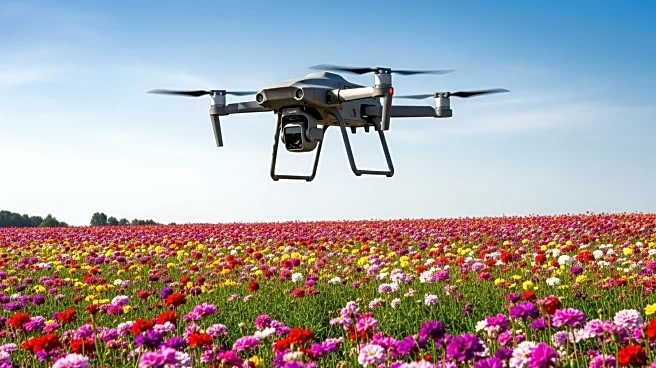What's Happening?
ZIYAN has launched a new AI-driven surveillance system designed to tackle the challenges of detecting illegal poppy cultivation. The system utilizes the ZIYAN F15 unmanned helicopter equipped with a high-definition gimbal camera and an AI recognition platform. This integration allows for efficient aerial reconnaissance, AI data analysis, precise geo-tagging, and rapid enforcement. The helicopter boasts a flight endurance of 100 minutes and an operational radius of 30km, enabling wide-area patrols. The onboard camera captures ultra-clear imagery, which is processed by the AI Poppy Recognition System, trained on extensive datasets to detect poppy growth with high accuracy. The system highlights suspected cultivation sites on digital maps, aiding law enforcement in navigation and eradication efforts.
Why It's Important?
The introduction of ZIYAN's AI-powered surveillance system represents a significant advancement in counter-narcotics operations. By automating the detection and mapping of illegal poppy cultivation, the system reduces reliance on manual expertise and improves accuracy and consistency. This technology enhances productivity, as demonstrated by a case study where the system inspected a village in minutes, a task that previously required hours and numerous officers. Beyond narcotics enforcement, the system's applications extend to agriculture, forestry, cross-border monitoring, and urban management, offering a versatile tool for various sectors. The solution aims to minimize operational risks and reduce manpower requirements, promoting safety and cost-effectiveness.
What's Next?
ZIYAN's AI-enabled UAV solution is expected to be deployed in various sectors beyond narcotics enforcement. Its capabilities in detecting unauthorized crop cultivation, strengthening cross-border monitoring, and urban grid management suggest potential expansion into agriculture and urban planning. The technology's ability to conduct scheduled patrols and targeted re-inspections may lead to broader adoption in high-incidence areas. As the system transitions from manual to intelligent operations, stakeholders in law enforcement and other industries may explore further integration to enhance efficiency and safety.
Beyond the Headlines
The deployment of AI-driven surveillance systems raises ethical and legal considerations, particularly regarding privacy and data security. As the technology becomes more prevalent, discussions around regulatory frameworks and guidelines for its use will likely intensify. The shift towards intelligent, precision-based operations may also influence cultural perceptions of surveillance and enforcement, prompting debates on the balance between security and individual rights.








